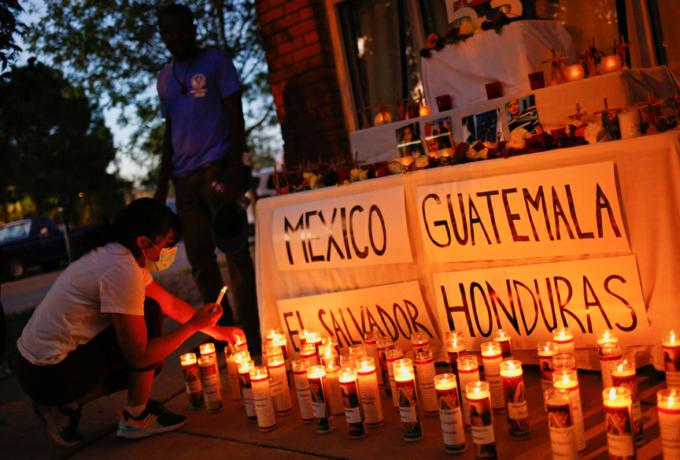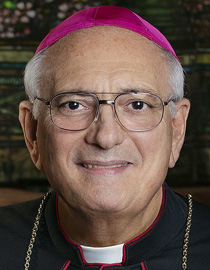
Faith
I would not be here today if my grandfather had not taken that risk. When I asked him, "Why did you come to this country," he would answer with only one word, "miseria" (misery), which means that they were facing a lack of food, no work and no future.

DiMarzio
A smuggling attempt in June resulted in the death of 53 individuals in a truck near San Antonio, Texas.
Pope Francis has stressed the need for all of us to "walk with migrants." This means not to solve everyone's problems, but rather to accompany migrants in their journeys in life. Some people can meet and serve individual migrants.
All of us, however, view many of the journeys in today's world from afar. Some of us badly misunderstand this reality. The tragic death of 53 people is, unfortunately, only the tip of the iceberg.
Migrants come to this country for many reasons. I cannot help but remember the story of my paternal grandfather, Francisco DiMarzio, who came to this country in 1912 as an unaccompanied minor.
He was about 15 years old when he left his village in Italy and traveled to the city of Newark, New Jersey, where some people from his home village had settled. In those years, there were few limitations on immigration, but in the 1920s, severe restrictions were placed on many countries, including southern and eastern European countries.
I would not be here today if my grandfather had not taken that risk. When I asked him, "Why did you come to this country," he would answer with only one word, "miseria" (misery), which means that they were facing a lack of food, no work and no future.
Misery causes many migrants to come today -- some flee gang violence, others environmental disasters, and others untenable conditions caused by political corruption. Most legal immigrants and many immigrants who enter the country illegally come to rejoin their relatives or find a future not available to them in their own country.
A June Supreme Court decision allowed the Biden administration to change the Trump-era policy that required U.S. asylum-seekers to remain in Mexico while asylum claims were pending in U.S. immigration courts. The change in policy offers some protection to migrants from the well-documented dangers of Mexican border cities.
Still, more resources need to be deployed to ensure timely hearings, legal representation and basic services for these asylum-seekers. Many of those driven to come to the U.S. will be real assets to our country. But, at present, they are forced into the hands of smugglers or to use other means of illegal border crossing.
However, perhaps there is some light at the end of the migration tunnel. A few weeks ago in Los Angeles, a historic meeting of Western Hemisphere countries was held where 20 countries issued a Declaration on Migration and Protection. Regional cooperation is needed to humanely manage migration in the hemisphere.
The participating nations made four significant commitments.
First, the countries agreed to stabilize migration movements through investments to address the root causes of migration so that people can remain in their own countries.
Second, they agreed to expand legal avenues for migration with the goal of diminishing the need for unregulated migration.
Third, they agreed to better manage their borders, making a special effort to address smuggling networks and human trafficking.
Fourth, they agreed to cooperate and share information on unexpected, large-scale border crossings.
These commitments are a positive sign of cooperation, which will take time to implement. But the declaration offers hope that cooperation among countries and U.S. efforts to engage other countries on the causes and management of migration can prove beneficial to all.
- Bishop Nicholas DiMarzio is retired bishop of the Diocese of Brooklyn, N.Y. He writes the column "Walking With Migrants" for Catholic News Service and The Tablet.
Recent articles in the Faith & Family section
-
Popular devotions and the liturgyFather Robert M. O’Grady
-
The Fight for Our FaithMaureen Crowley Heil
-
The shepherd's voiceScott Hahn
-
Scripture Reflection for April 21, 2024, Fourth Sunday of EasterJem Sullivan
-
The new Temple: How Easter changes religionDr. R. Jared Staudt


















